Daily Current Affairs and GK | 16 September 2020

Main Headlines:
- 1. India elected as member of UN’s Commission on Status of Women.
- 2. Aircraft (Amendment) Bill 2020 passed in Rajya Sabha.
- 3. World Ozone Day: 16 September
- 4. PM Modi inaugurates seven projects under ‘Namami Gange’ and ‘AMRUT’ schemes.
- 5. New AIIMS at Darbhanga and Haryana Orbital Rail Corridor Project approved.
- 6. Essential Commodities (Amendment) Bill, 2020 passed in Lok Sabha.
- 7. Education Minister gives AICTE Visvesvaraya Best Teacher Awards 2020.
- 8. A resolution seeking withdrawal of proposed Electricity Amendment Bill 2020 passed by Telangana Assembly.
- 9. My Family-My Responsibility programme started in Maharashtra.
- 10. Backyard Horticulture programme launched by J&K Horticulture Department.
- 11. MeD ROBO developed by Diesel Loco Shed of Waltair Division.
- 12. Israel, UAE and Bahrain sign Abraham Accord.
- 13. Uttar Pradesh Special Security Force (UPSSF) to be formed in next three months.
Happy February get 35% Off
Use Coupon code FEB26
1. India elected as member of UN’s Commission on Status of Women.
- India and Afghanistan have been elected as the member of the UN’s Commission on Status of Women (CSW).
- The term for India as a member will be for 4 years from 2021-25.
- India, Afghanistan and China contested for the elections, but China failed to become the member.
- This year marks the 25th anniversary of the Fourth World Conference on Women and the adoption of the Beijing Declaration and Platform for Action (1995).
- The 64th session of the Commission on Status of Women was suspended due to COVID-19. Its theme was “Beijing +25: Realizing Gender Equality and the Empowerment of All Women and Girls.”
- India had also been elected as the non-permanent member of the UN Security Council, and the new term will begin from January 2021.
- Commission on Status of Women (CSW):
- It is a functional commission of the United Nations Economic and Social Council (ECOSOC).
- It is the UN organ promoting gender equality and the empowerment of women.
- It was established in 1946 by ECOSOC resolution 11(II).
- 45 UN members can serve as members of the CSW at a time.
- Headquarters: New York, USA
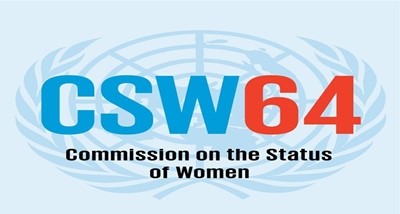
(Source: News on AIR)
2. Aircraft (Amendment) Bill 2020 passed in Rajya Sabha.
- Aircraft (Amendment) Bill 2020 has been passed by the Parliament.
- The bill aims to amend the Aircraft Act, 1934.
- The bill will convert three bodies of the Ministry of Civil Aviation- the Directorate General of Civil Aviation, the Bureau of Civil Aviation Security and the Aircraft Accidents Investigation Bureau, into statutory bodies.
- These bodies will be headed by a Director-General who will be appointed by the Centre.
- Directorate General of Civil Aviation (DGCA) was formed in 1997. It registers civil aircraft, certifies airports, provides license to pilots and air traffic controllers and coordinates International Civil Aviation Organization (ICAO) matters.
- Bureau of Civil Aviation Security (BCAS) was established in 1978. It is responsible for Civil Aviation Security and is the implementing authority of Annexure 17 to the Chicago convention of ICAO.
- Aircraft Accident Investigation Bureau (AAIB) was formed in 2011. It was formed in compliance with the Standards and Recommended Practices (SARPs) of ICAO.
3. World Ozone Day: 16 September
- International Day for the Preservation of the Ozone Layer or World Ozone Day is a celebration of the remarkable Montreal Protocol that was signed by many countries to protect the ozone layer.
- In 1985, countries around the world adopted the Vienna Convention for the Protection of the Ozone layer.
- Under the convention’s Montreal Protocol, 99% of the Ozone Depleting Substances have been phased out.
- On 16 September 2009, the Vienna Convention and Montreal Protocol became the first treaties to be ratified universally.
- Kigali Amendment (2019) to the Montreal Protocol that aims at phasing down HFCs can avoid up to 0.4° C rise in the Earth’s temperature by the end of this century.
- In 1994, UNGA adopted the resolution to mark 16 September as World Ozone Day.
- Ozone layer is the shield of gas that protects the Earth from the harmful UV rays of the sun.
- The depletion of the ozone layer can cause skin cancer in humans and destruction of the ecosystem.
- Theme 2020: Ozone for Life - 35 Years of Ozone Layer Protection

4. PM Modi inaugurates seven projects under ‘Namami Gange’ and ‘AMRUT’ schemes.
- PM Modi has inaugurated seven projects under ‘Namami Gange’ and ‘AMRUT’ schemes in Bihar.
- Bihar Urban Infrastructure Development Corporation Ltd. will implement these projects.
- The inaugurated projects are related to water supply, sewerage treatment and riverfront development.
- The projects have been inaugurated on the occasion of Engineer’s day, 15 September, which is also the birth anniversary of Mokshagundam Visvesvaraya.
- PM has also said that more than 2 crore water connections have been given all over the country under Jal Jeevan Mission.
- Namami Gange was approved by the Union government in June 2014. It aims to reduce pollution in Ganga and to conserve and rejuvenate Ganga. It is being implemented by National Mission for Clean Ganga.
- Atal Mission for Rejuvenation and Urban Transformation (AMRUT) was launched in June 2015. It focuses on establishing infrastructure that could ensure a sufficiently strong sewage network and water supply for urban transformation.
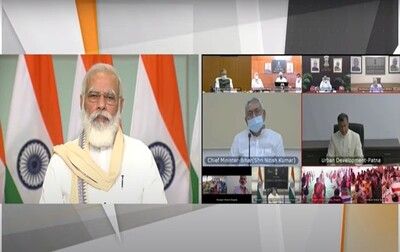
(Source: News on AIR)
5. New AIIMS at Darbhanga and Haryana Orbital Rail Corridor Project approved.
- Union Cabinet has approved the establishment of new AIIMS at Darbhanga, Bihar and Haryana Orbital Rail Corridor Project from Palwal to Sonipat.
- New AIIMS at Darbhanga will be established under Pradhan Mantri Swasthya Suraksha Yojana (PMSSY). Its completion may take four years.
- Newly approved Haryana Orbital Rail Corridor Project from Palwal to Sonipat will run via Sohna-Manesar-Kharkhauda and end at Harsana Kalan station on the Delhi-Ambala section.
- Haryana Rail Infrastructure Development Corporation Limited (HRIDC) will implement the project. It is a Joint Venture Company of the Ministry of Railways and the Haryana government.
- Haryana Orbital Rail Corridor Project may take 5 years to complete.
- Currently, 15 AIIMS are functioning in the country and the government is working on making eight more AIIMS operational by 2025.
- Pradhan Mantri Swasthya Suraksha Yojana (PMSSY):
- Launched in 2003, PMSSY aims to curb regional imbalances in the field of tertiary healthcare services and promote facilities for quality medical education in India.
- Two components of PMSSY are setting up of AIIMS like institutions and upgradation of Government Medical College/Institutions.
- Haryana:
- It was formed on 1 November 1966. Its capital is Chandigarh. Its Governor is Satyadev Narayan Arya and Chief Minister is Manohar Lal Khattar.
- Its border is surrounded by Punjab, Himachal Pradesh, Uttarakhand, Uttar Pradesh and Rajasthan. It surrounds Delhi on three sides.
6. Essential Commodities (Amendment) Bill, 2020 passed in Lok Sabha.
- Essential Commodities (Amendment) Bill, 2020 has been passed in Lok Sabha and it will replace the Essential Commodities (Amendment) Ordinance issued on 5 June 2020.
- The bill will amend Essential Commodities Act, 1955 and give the central government the powers to declare certain commodities as essential products. The commodities include food items, fertilizers, and petroleum products.
- The bill excludes commodities like cereals, pulses, oilseeds, edible oils, onion and potatoes from the list of essential commodities.
- The government can regulate these commodities only in extraordinary circumstances of war, famine, extraordinary price rise and natural calamity of grave nature.
- As per the bill, the government can regulate the stock of an essential commodity that a person can hold.
- The provisions of the bill about stock limits and regulation of food items will not apply for government orders about the Public Distribution System or the Targeted Public Distribution System.
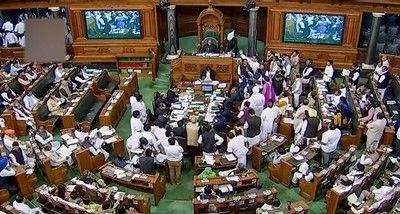
(Source: News on AIR)
7. Education Minister gives AICTE Visvesvaraya Best Teacher Awards 2020.
- Education Minister Ramesh Pokhriyal Nishank has given AICTE Visvesvaraya Best Teacher Awards 2020 on the occasion of Engineers Day.
- He gave awards to 12 faculty members of AICTE approved institutes.
- AICTE Visvesvaraya Best Teacher Awards have been introduced for the first time.
- The awards are aimed at recognizing meritorious faculties on the Engineer’s Day every year at the National level.
- He also talked about National Education Policy 2020 approved by Union Cabinet on 29 July 2020.
- In July 2020, the government has renamed the Ministry of Human Resource Development as the Ministry of Education (MoE).
- All India Council for Technical Education (AICTE):
- It is a statutory body formed in November 1945.
- It comes under the Ministry of Education (formerly called Ministry of Human Resource and Development).
- It is an apex advisory body at the national level.
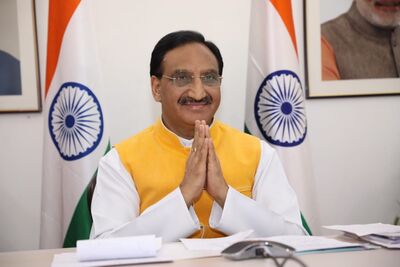
(Source: News on AIR)
8. A resolution seeking withdrawal of proposed Electricity Amendment Bill 2020 passed by Telangana Assembly.
- State Assembly of Telangana has passed a resolution seeking withdrawal of the proposed Electricity Amendment Bill 2020 by the Centre.
- Proposed Electricity Amendment Bill 2020 seeks to amend the Electricity Act, 2003.
- Telangana’s Chief Minister Chandrasekhar Rao has said that the bill is against the interests of farmers and states. He also said that the bill would help the private sector.
- If the bill becomes an act, it will take away the role of states in the appointment of members of the State Electricity Regulation Commission.
- Telangana:
- Its capital is Hyderabad. It was formed in June 2014.
- Its Governor is Tamilisai Soundararajan and Chief Minister is K.K. Chandrasekhar Rao.
- Telangana’s state animal is reindeer, the state bird is Indian roller, the state tree is jummichettu and the state flower is Tangedu.
9. My Family-My Responsibility programme started in Maharashtra.
- ‘My Family-My Responsibility’ programme has been started in Maharashtra to control the spread of Covid-19.
- Under the programme, health teams will visit each and every household in Maharashtra with the help of local public representatives.
- The team will test the health condition of an individual and decide upon the treatment.
- Maharashtra:
- In terms of area, Maharashtra is India’s third largest state. In terms of population, it is second most populous state.
- Its boundary is covered by 6 states. Karnataka and Goa are located to its south. Telangana is located to its southeast. Chhattisgarh is located to its east. Gujarat and Madhya Pradesh are located to its north.
- Chief Minister: Uddhav Thackrey, Governor: Bhagat Singh Koshyari
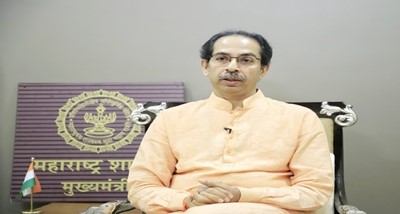
(Source: News on AIR)
10. Backyard Horticulture programme launched by J&K Horticulture Department.
- Backyard Horticulture programme has been launched by J&K Horticulture Department under the CAPEX scheme.
- The programme has been launched at Panchyat Jaswan in Marh block of Jammu district.
- The programme aims to promote organic food production for home consumption.
- Under the programme, farmers will be given a minimum of three fruit plants costing Rs 200 at 90% subsidy.
- Farmers were also demonstrated cultural practices that are to be adopted while planting these fruit plants in the backyard of houses to keep away insects and diseases.
- Jammu and Kashmir:
- After suspending Article 370, the government has reorganized Jammu and Kashmir into Union Territory of Jammu and Kashmir and Union Territory of Ladakh on 31 October 2019.
- Union Territory of Jammu and Kashmir is located to the north of Himachal Pradesh and Punjab.
- Its winter capital is Jammu and summer capital is Srinagar.
- Important valleys in the region: Tawi Valley, Chenab Valley, Poonch Valley, Sind Valley, Lidder Valley
11. MeD ROBO developed by Diesel Loco Shed of Waltair Division.
- MeD ROBO has been developed by Diesel Loco Shed of Waltair Division, Vishakhapatnam.
- MeD ROBO is a robot that will assist hospital staff in serving COVID-19 patients.
- It is operated through a unique mobile app.
- It is being used to provide medicines, medical equipment, and food to patients.
- It is capable of raising the alarm in case of the abnormal high temperature reading.
12. Israel, UAE and Bahrain sign Abraham Accord.
- Israel, UAE and Bahrain have signed the first Arab-Israeli peace deal in 26 years named Abraham Accord.
- The Accord does not mention the Israeli-Palestinian conflict.
- UAE and Bahrain had recently announced to normalize their bilateral relation with Israel.
- Egypt was the first Arab country to sign a peace agreement with Israel in 1979, followed by Jordon (1994).
- As per the Accord, the two countries will establish their embassies in Israel and will cooperate in various sectors like tourism, trade, security and health.
- Israel, UAE and Bahrain:
|
Country |
Israel |
United Arab Emirates (UAE) |
Bahrain |
|
Location |
Middle East (on Mediterranean Sea) |
Western Asia (at the northeast end of the Arabian Peninsula) |
A country in the Persian Gulf |
|
Capital |
Jerusalem |
Abu Dhabi |
Manama |
|
Currency |
Israeli shekel |
United Arab Emirates Dirham |
Bahraini Dinar |
|
Prime Minister |
Benjamin Netanyahu |
Mohammed Bin Rashid Al Maktoum |
Khalifa Bin Salman Al Khalifa |
|
President |
Reuven Rivlin |
Khalifa bin Zayed Al Nahyan |
- |

13. Uttar Pradesh Special Security Force (UPSSF) to be formed in next three months.
- UP government aims to form UPSSF in the next three months and has asked DGP to prepare a roadmap for the force in three days.
- The creation of UPSSF was announced on 26 June 2020 and notified on 31 August 2020.
- On 30 July 2020, the UP cabinet has approved its formation of force with 9,900 personnel in the first phase.
- In the Monsoon session, the legislative assembly of UP had passed Uttar Pradesh Special Security Force Act, 2020.
- Maharashtra and Odisha have similar forces through Maharashtra State Security Corporation Act, 2010 and Odisha Industrial Security Force Act, 2012.
- An Additional Director-General level officer will lead UPSSF. The force will provide security to notified persons, residential premises and other vital installations such as courts, Metro rail, airports, and banks.
- Subsection (1) of Section 10 of the UPSSF Act provides UPSSF powers to arrest without warrant and without any order from Magistrate.
- Section 10 of the UPSSF Act is similar to section 11 of the Central Industrial Security Force Act, 1968. Section 11 of the CISF Act, 1968, gives CISF powers to arrest without warrant.
- Central Industrial Security Force (CISF):
- It is one of the Central Armed Police Force in India.
- It was established in 1969 under an act of Parliament.
- It works under the Ministry of Home Affairs.
- Currently, it provides protection to 300 industrial units, government infrastructure projects and establishments in India.
- Current Director General: Rajesh Ranjan
- Headquarters: New Delhi





 15 September 2020 Current Affairs
15 September 2020 Current Affairs 








Comments